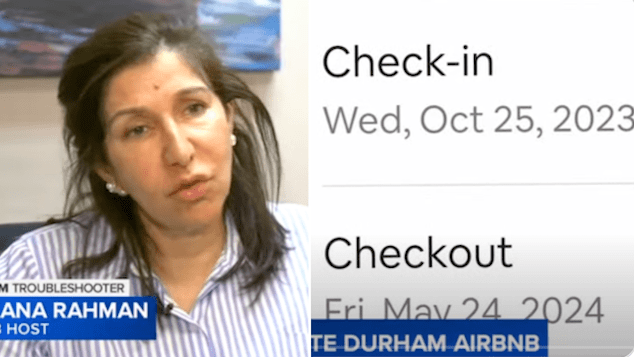

Airbnb host Farzana Rahman, criticized by guests who refuse to move out after 7-month contract ends at Durham, North Carolina condo, is now forced to take squatters to housing court sooner to legally evict them. Critical mistakes Airbnb hosts make when renting are explored.
She sought to take advantage of the generally higher rates that hosts can charge using Airbnb rent your property to potential tenants, but one North Carolina single mother has now found out the hard way, the Easy money sometimes comes with risks..
Farzana Rahmancondominium owner in Durham has said he has been hit by loss of income after Airbnb guests refused to leave after the end of a 7-month contract.
“No, we haven’t moved.”
The unnamed tenants registered on October 25, 2023 and were due to leave by May 24, but have now indicated they intend to stay indefinitely and have forced the single mother, who is struggling to get her son to school. university, to move forward. in housing courtwhich could take months before the ‘squatters’ could be forced to legally vacate the property.
Rahman’s listing stipulated that her home would be available to rent for a minimum of 28 days for the price of $2,684, which technically puts her at remote risk of being subject to civil law if a tenant (whether an Airbnb guest or a rental agreement) refuses to leave. after living in a property for more than 30 days, the typical amount of time most states consider a tenant allowed tenants’ rights – and the right to have your case heard in court.
Two weeks ago, when Rahman’s agreement with guests ended, the hostess received a rude surprise when her cleaners arrived at the property and discovered that the ‘tenants’ had never left according ABC7Chicago.

‘No trespassing’
“They opened the door and said, ‘No, we haven’t moved.’ Rahman told the outlet.
She (the cleaner) said, “Should I come tomorrow?” And they told me: “No, don’t come back.”
‘Now they refuse to leave until there is an eviction order. I think they are just trying to buy time to stay there for free because they haven’t paid.
‘This is my place, and I mean, I have this income; My son is in the university. I’m a single father.’ Rahman said.
But there is more.
Critical Mistakes Airbnb Hosts Should Avoid
When Rahman arrived at the property with officers, the squatters assured them they would leave the next day.
But the next morning, they were still occupying the condo and had instead posted a ‘no trespassing’ sign.
The sign said: “We will vacate the property when you file proper paperwork with the civil magistrate for an eviction as we are legal residents of this house.”
Rahman also contacted Airbnb for help, but to no avail. He claims that the company has only sent him messages to get help for his safety and legal help to evict the squatters.
According to Airbnb website, ‘Guests who stay in a house or apartment for a month or more (the exact number of days depends on the state) can establish rights as tenants.’ and are therefore protected by local rental laws.
It also advises landlords to seek summary proceedings to evict illegal guests.
‘There are statutes in almost all jurisdictions that allow landlords to use summary procedures to evict tenants. A summary proceeding is a judicial proceeding that allows the landlord to recover possession of the leased property on an expedited basis.
“You should contact a landlord-tenant attorney or your local county courts to learn more about eviction laws where you live, as they may affect your ability to evict an overstaying guest. your monthly stay”. it reads on the page.
It is noteworthy that Airbnb, despite being the intermediary, has no legal obligation to force guests to leave, nor any legal provision to compensate the host for the amount lost on future rentals if the guest decides to stay.
Airbnb’s policy specifically places the onus on the host to accept or reject an offer from a potential guest, and the service, which bills itself as a facilitator, recommends that guests thoroughly vet guests by reviewing past reports from other hosts. , while common sense would do so. It also means being tired of renting to a first-time Airbnb user beyond 30 days.



